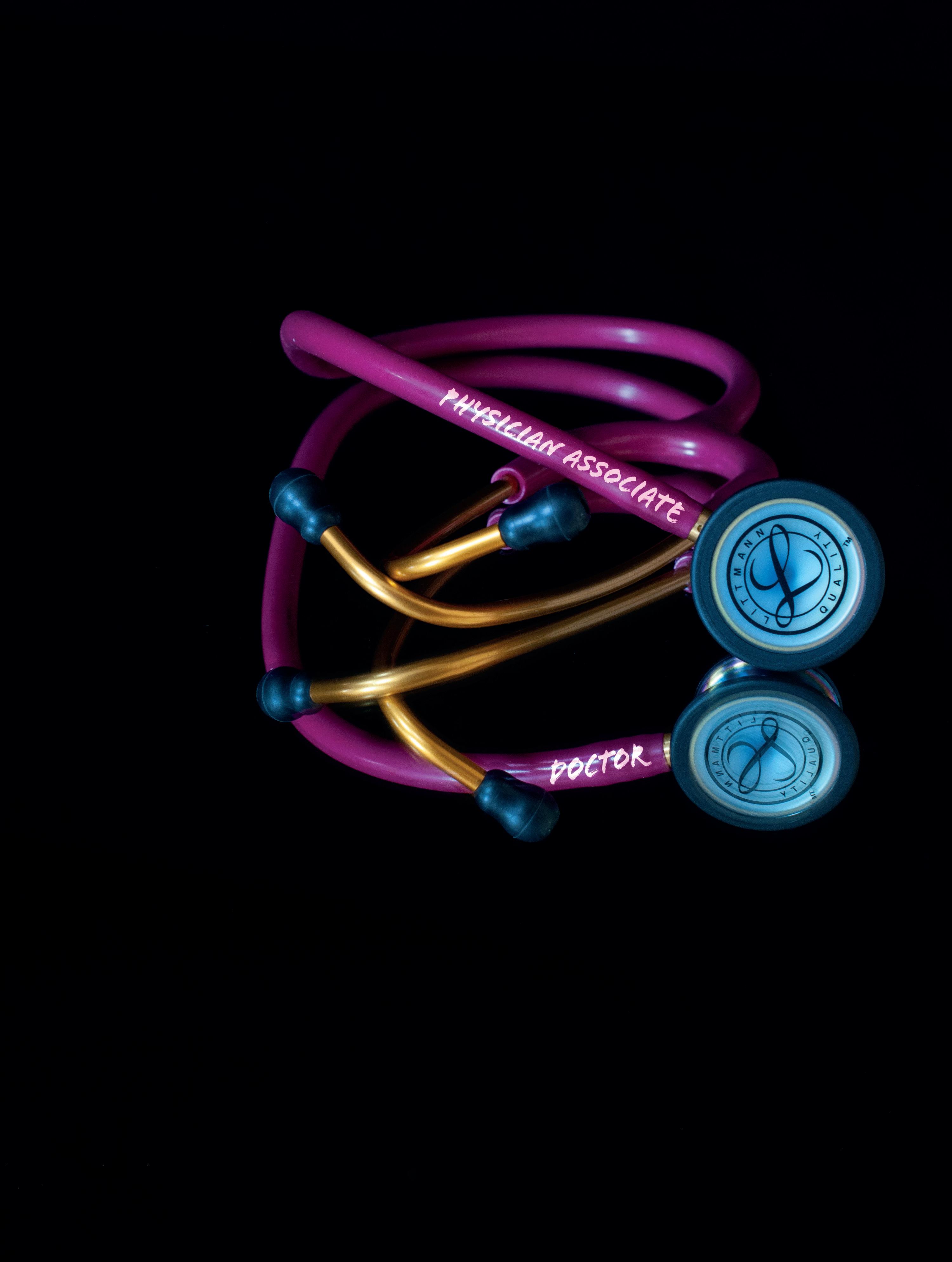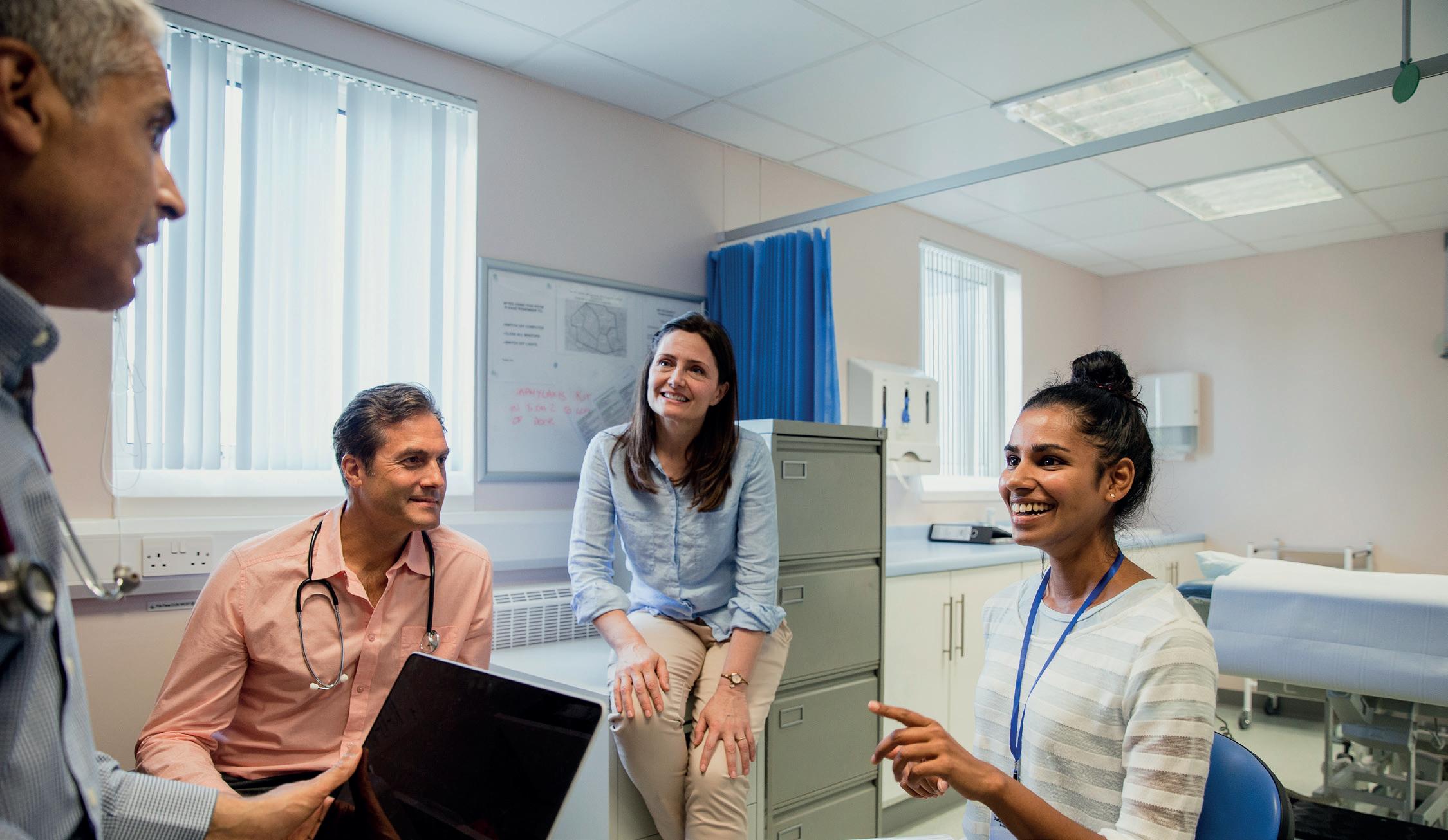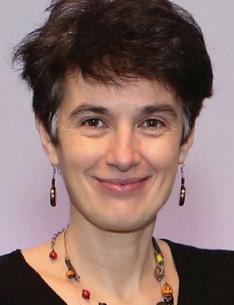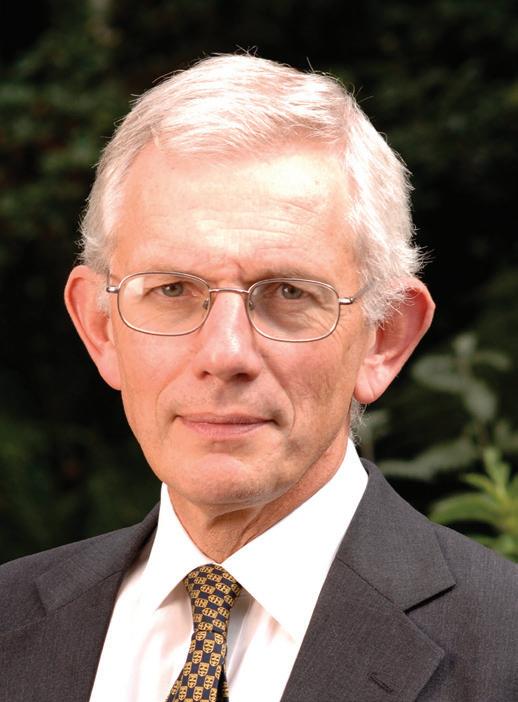Deprivation



the doctor The magazine for BMA members Issue 59 | September 2023 Crossed wires The difficult relationship with physician associates Robodoc The rise of AI in medicine The cost of a drink Putting a price on alcohol misuse
austerity has fuelled the mental health crisis
to detention How
3
At a glance
Historic joint action planned by junior doctors and consultants
4-9
Can you sign this?
The often thorny relationship with physician associates

10-13
‘I’m sorry Dave, I can’t let you prescribe that’ The rise of artificial intelligence in medicine
14-17
Austerity’s legacy
The link between deprivation and the soaring rate of mental health detentions

18-21
No half measures
The growing evidence for the benefits of minimum unit pricing for alcohol
22 Your BMA Why the association needs to do more to support its leaders from all backgrounds
23 Viewpoint Are undergraduates being made to study too much?
Welcome
Phil Banfield, BMA council chair

The September issue of the magazine is the first since junior doctors and consultants announced escalated joint strike action in England in one of the longest industrial disputes in the NHS’s history.
The momentum of the junior doctor reballot – thanks to the continuing increase in membership of the BMA and the hard work of our organisers, representatives and staff – saw thousands more votes cast in favour of taking action. The Government underestimated your resolve to fix falling real-terms pay and reverse appalling conditions many of you experience every day. Politicians’ intransigence only hardens our resolve to make this stand for our profession and our patients.
None of us wanted to be in this position but many of you are exhausted and feel under siege. It’s not possible to run a health service on goodwill for more than a decade; working environments often feel more like war zones than centres of care and compassion, but care is what we deliver 24/7. This is about valuing your expertise, but it is also about the future of the NHS. We will not stop advocating for doctors, patients and the health service until we are heard. More information on all the latest news surrounding industrial action can be found in this month’s At a Glance section.
In this edition of The Doctor we begin our look at the role of the physician associate. There are mounting concerns with (lack of) supervision, regulation and confusion for the public about the limits of their practice. They are not doctors. We also address the potentially transformational role artificial intelligence appears likely to play in medicine and healthcare and ask what that revolution might mean for doctors and patients.
We unveil the second part in our two-part long-read investigation into rising numbers of detentions under the Mental Health Act, this time focusing on a society blighted by austerity politics, substance misuse and economic misery, and the role these concurrent catastrophes play in making people so ill they have to have their liberty deprived. Elsewhere, we find out about the impact of minimum unit pricing in Scotland and Wales and assess the effects of alcohol on the health service.
The BMA has never been stronger as your trade union and professional association. We will use our growing voice to organise with you locally and nationally; to help you help each other through collective action. Together, we will make the difference that so many of you have said you want to see.
Keep in touch with the BMA online at instagram.com/thebma twitter.com/TheBMA

02 the doctor | September 2023
MATT SAYWELL
In this issue
Juniors and seniors set for joint action
Junior doctors and consultants will undertake four days of joint industrial action in England this autumn after junior doctors voted overwhelmingly to extend their strike mandate in their campaign for full pay restoration.
Across September and October – for the first time in the history of the NHS – there will be four days in which junior doctors and consultants coordinate their industrial action. This is in addition to other days on which just junior doctors or consultants will be on strike.
The announcement was made as 98 per cent of junior doctors, from a turnout of 71 per cent, voted in favour of continuing industrial action, renewing their mandate for a further six months to 29 February, 2024.
Junior doctors have so far staged 19 days of strike action since March. Following the reballot result, they have announced six further days, on 20, 21, 22 September and 2, 3, 4 October.
Consultants have staged four days of industrial action so far and planned at least five more in the coming weeks, on 19 and 20 September and 2, 3 and 4 October.

The joint days of action will see ‘Christmas Day’ levels of staffing from both groups.
A rally has been organised in Manchester, for junior doctors and consultants, on 3 October – when the Conservative party conference is to be held in the city. Both groups of doctors have seen their pay drop by more than a third in real terms over the past 15 years while working in a hugely understaffed and under-resourced health service.
The Government has handed ‘final’ below-inflation pay deals to consultants and junior doctors in England this year.
The prime minister has imposed a
6 per cent uplift for consultants and 6 per cent plus a lump-sum £1,250 for junior doctors and refuses to enter further talks with either group.
Rob Laurenson and Vivek Trivedi, co-chairs of the BMA junior doctors committee, pointed out that the NHS has already lost about £1bn owing to strike action, roughly the amount it would have cost to award junior doctors pay restoration.
They said: ‘Consultants and junior doctors stand shoulder to shoulder in solidarity after months of facing the same inflexibility from government.’
Vishal Sharma, chair of the BMA consultants committee, added: ‘Never before have NHS consultants and junior doctors been forced to strike together for days on end, but that is where we have been brought by this government. They must act to address our pay erosion.’
In Wales, consultants, junior doctors and staff, associate and specialty doctors unanimously voted to ballot for industrial action after the Welsh Government’s 5 per cent pay offer for 2023/24 was rejected.
Doctors in Wales have faced real-terms pay cuts of around a third, with junior doctors’ pay eroding by 29.6 per cent since 2009. BMA Cymru Wales chair Iona Collins said: ‘Unless a credible offer is on the table, we have nothing more to do but ballot our members.’
Junior doctors in Scotland accepted a 12.4 per cent pay uplift for this year, backdated to April, with an agreement from the Scottish Government to work towards long-term full pay restoration.

bma.org.uk/thedoctor the doctor | September 2023 03
AT A GLANCE
STRENGTH IN UNITY: Consultants on strike in Brighton in August
COLLINS: Credible offer only way forward
CAN YOU SIGN THIS?

04 the doctor | September 2023
GETTY
In November 2022, 30-year-old Emily Chesterton died from a pulmonary embolism after a misdiagnosis from a PA (physician associate). She thought she was seeing a GP.
The coroner at her inquest said she should have been immediately referred to hospital and that, if she had, it was likely she would have survived the blood clot she had been told was a sprain in her calf.
Emily’s death is perhaps the starkest example of what can go wrong without sufficient supervision of the unregulated PA role, which NHS England has plans to expand.
Some doctors fear wider deployment of PAs is a risk to patient safety. Others believe there is a role for them in the NHS, but one that must be more clearly defined for clinicians and patients.
After a motion passed at this year’s BMA annual representative meeting urging the association to lobby for PAs to be named ‘physician assistants’ rather than associates, and to be regulated outside the GMC, the debate about the role is under the spotlight.
PAs were introduced in the UK in the early 2000s to address workforce shortages. This year’s NHS England long-term workforce plan aims to establish
a workforce of 10,000 PAs by 2036/37, with at least 1,300 PAs to be trained each year from 2023/24.
Latest NHS Digital data shows 1,490 PAs working in secondary care in England as of March, a 79 per cent rise from 831 in March 2020 when comparable data were first published.
In general practice, there were 716 full-time equivalent PAs in England at the end of July this year –up from 13 in September 2015.
‘Masquerading as doctors’
The Royal College of Physicians’ FPA (Faculty of Physician Associates) has been campaigning for ‘timely regulation’ of PAs and working on ways to explain better their scope of practice.
But some doctors say patients are often left unclear if they are seeing a doctor or a PA because of how PAs dress and communicate – raising consent issues.
‘From a patient’s point of view, it’s difficult to distinguish,’ says Jatinder Hayre, a London-based foundation year 2. ‘Being seen by someone in formal clothes with a stethoscope around their neck, you’d assume they were a doctor.
‘Some PAs are sort of “benefiting” from the general
bma.org.uk/thedoctor the doctor | September 2023 05
‘They’re making decisions for which you’re going to be the one ultimately liable’
Physician associates were introduced as a means of relieving the strain on doctors but there are growing concerns about clinical governance – such as unregulated PAs asking doctors to sign prescriptions and in some cases altering them. And, as Ben Ireland hears, patients often cannot tell them apart from doctors
public’s lack of understanding about their role, and that’s becoming more widespread.’
Dr Hayre would like to see PAs in uniforms with clear ID badges. ‘It boils down to communication,’ he adds. ‘This should be bread and butter – but I’ve been in situations where PAs have been masquerading as doctors by wearing the wrong lanyards or saying they’re “more experienced” than the doctor without declaring their actual role.’ This can cause identities to be misconstrued, he says.
Tal Ellenbogen, an East Midlands regional junior doctor committee member who spoke in favour of the ARM motion, warned PAs could be mixed up with associate specialists, a type of staff, associate specialist and specialty doctor he feels can be ‘devalued’ by the confusion.

Dr Hayre supports the name change proposal, to make PAs’ level of training clear for patients, citing Emily Chesterton’s mother’s comment in a BBC interview that ‘physician associate sounds grander than a GP’.
The FPA says it has ‘worked hard to inform and guide the profession, so they understand how to introduce themselves to patients and use the correct terminology’ as a ‘relatively new’ NHS role and is working on leaflets, posters and infographics for patients, plus guidance for PAs on introducing themselves.
‘It is very important that patients have clarity

about exactly who is caring for them and the scope of practice of that healthcare professional,’ it says.
The GMC says it would only intervene ‘if we believe a PA poses a serious risk to patients, has significantly or repeatedly failed to meet our standards, or has threatened public confidence in the profession’. It says ‘all healthcare professionals have a responsibility to introduce themselves properly’ but that ‘local systems’ also have ‘an important role to play’ in ensuring this.
‘Acting independently’
There have been reports of PAs filling stretched hospital rotas, with some covering senior house officer roles. Dr Hayre says this is ‘incredibly dangerous’ as this would entail performing complicated procedures which may be beyond their scope of practice or initiating complicated drugs.
‘These are decisions that need to be taken at a senior medical level, but they are taking [them] independently,’ he says.
Dr Hayre argues that the ‘initial sell’ of PAs was that they would take procedural tasks away from doctors, who would be freed up to do more complex tasks. But he says the reality is that PAs are often not based on wards but ‘almost let free in this wild environment of outpatients’.
The ARM motion says doctors should be able to refuse to supervise PAs, who ‘must take personal responsibility for their professional actions’ and only
06 the doctor | September 2023
‘We have no idea what PAs are supposed to know’
HAYRE: PAs should wear clear identity badges GETTY
work under a named doctor who is ‘immediately available, appropriately indemnified and specifically consents in writing to supervise’.
The FPA says each PA should have a named consultant or GP who agrees their individual scope of practice, and that PAs are accountable for the care they provide, once a task is delegated. Quoting GMC guidance, it says delegating doctors are responsible for ensuring PAs have ‘the necessary knowledge, skills and training’ for the task.
If a consultant or GP is not immediately contactable, the FPA says it is on them as supervisors to find a deputy, who must be specialty trainee 3 grade or above.
Guidance to give ‘greater clarity’ on PA supervision is being developed by the FPA, which is also surveying its members on supervision levels.
The GMC says its draft educational framework, which will come into effect when regulation starts, ‘provides an indication of the minimum range of tasks [PAs] can safely undertake’ but says ‘decisions on tasking and supervision are best made locally’.
It adds that its ‘ethical guidance places a responsibility on PAs not to work beyond the scope of their competence and to escalate and ask for help when needed’.
‘Preferential treatment’
Dr Hayre says a ‘sour feeling’ can develop when PAs, who cannot (yet) prescribe medication, ask colleagues – particularly foundation year doctors – to do so on their behalf. This can often be without the doctor seeing the patient themselves. He has refused to do this, stressing ‘this is my GMC licence under scrutiny’.
‘PAs are not under a regulatory body,’ says Dr Hayre. ‘They haven’t been through the rigorous medical and academic training we have, so why should we rely on their clinical judgement?’
Many doctors on rotation fear PAs have a greater influence on consultants owing to being ‘embedded’ in teams, which Dr Hayre says means they can get ‘preferential treatment’ in prescribing disputes. He says he is aware of instances of paper prescription notes being altered by PAs after the doctor
has signed them.
‘It’s an awful dichotomy,’ he says. ‘They’re making decisions for which you’re going to be the one ultimately liable.’
The ‘preferential treatment’ Dr Hayre describes is a common complaint among doctors competing with PAs for training opportunities. The complaint is not that PAs are being trained to a high standard, it is that this is to the detriment of doctors who need these skills for future roles and should be prioritised given finite training resources in the current workforce crisis.
The FPA told The Doctor it is aware of such ‘tensions’ but puts them down to an overall lack of training capacity.
‘Unfortunately, we do hear from doctors who feel that their training has been negatively impacted by the presence of PAs [but] we hear of examples where PAs have been introduced and doctors have benefited from training opportunities,’ it says.
The GMC has called for an urgent increase in training capacity but says ‘how training opportunities are created and divided is down to local management’.
Many doctors in foundation years and specialty training feel particularly aggrieved because they often earn less than PA colleagues.
Basic pay for foundation year 1s is £32,398 a year for 2023/24, after another sub-inflation pay award, with ST1s, ST2s, core trainee 1s and CT2s earning £43,923. They work 40-hour weeks before factoring in common unpaid overtime.
NHS England says PAs typically start on band 7 of Agenda for Change, which ranges from £43,742 to £50,056 per annum for 37.5 hours a week, though interns can be on band 6, which starts at £35,392.
While some argue doctors’ future earning potential is higher than PAs, doctors in training say they have bills to consider and that their pay should be more than PAs anyway owing to greater levels of responsibility they carry – such as prescribing.
Dr Hayre says the situation is ‘inherently unfair’. The Faculty of PAs says pay is set by the NHS, using a job evaluation and matching process to determine banding.
Some doctors fear an expanded role for PAs in the
bma.org.uk/thedoctor
the doctor | September 2023 07
‘These people aren’t doctors. Doctors are worrying about the erosion of a boundary’
‘PAs are not under a regulatory body... why should we rely on their clinical judgement?’
NHS will lead to a two-tier service, with traditionally under-doctored areas relying more heavily on filling roles with PAs.
The British Journal of GPs’ 2021 study found ‘significant workforce inequalities’, with fewer GPs per patient, and more PAs and pharmacists per patient, in more deprived areas.
Dr Hayre warns those geographical inequalities ‘will also lead to interventionbased inequality’.
‘Extra pair of hands’
Scheme), introduced in 2019, GP practices can claim back salaries of roles including PAs – essentially making them free to employ.
‘They’re an extra pair of hands,’ says Dr Salisbury who says she may not have employed the practice’s PA if their salary had to be paid for out of existing budgets.
‘PAs are incredibly well paid for their level of expertise’
GP Helen Salisbury has taken on a PA at her practice in Oxford, who she says is ‘very heavily supervised’ and focuses on more straightforward duties such as urine infections or coughs.
While Dr Salisbury says having a PA carry out technical procedures such as spirometry can be helpful, she notes the time pressures of discussing every patient they see – which she insists upon but warns not every GP does the same.
‘If I’m working with a medical student, foundation year doctor or specialty trainee, I have a pretty clear idea of what they should be able to do at each stage of their training,’ says Dr Salisbury. ‘Whereas we have no idea what PAs are supposed to know.’
Dr Salisbury is uncomfortable with PAs doing firstcontact work with patients. ‘That’s not very sensible or safe,’ she says. ‘Lots of things would be missed or diagnosed late. That’s where you need a GP.’
Under the ARRS (Additional Roles Reimbursement
If practices did have to fund PAs, she says, ‘I don’t know how much the role would exist’, noting space constraints at many surgeries and that PAs are ‘incredibly well paid for their level of expertise’.
‘They’ve done a degree and two more years, so similar to a fifth-year medical student, but they’re being paid way more than that medic will be until they’re several years qualified.’
‘Dumbing down’
PAs undergo a level 7 postgraduate (MSc) degree to qualify in the UK, usually over two years. The FPA says all programmes are run in accordance with the Competency and Curriculum Framework developed by the Department of Health and Social Care, the RCP (Royal College of Physicians) and the RCGP (Royal College of General Practitioners).
Doctors, who go through at least five years of medical school, have criticised the standard of questions on PA exams and OSCEs after the Faculty published a list of sample questions including some it now deems ‘too technical’.

08 the doctor | September 2023
GETTY
STETHS ALL ROUND: Patients can struggle to distinguish between a doctor and a PA
SALISBURY: ‘Doctors are worrying about the erosion of a boundary’
Dr Salisbury says: ‘You want questions to be technical. If a professional can pass the exam with a little help from their friend Google, what was the point of going to see them?
‘It feels like a dumbing down, a disrespect and a failure to understand exactly what we do and the danger of trying to have people with fewer skills doing it.’
The GMC said the PA national exam, standards of which were set by the RCP, will be renamed the PA registration assessment (PARA). This exam, which PAs will need to pass before joining the GMC’s register, will be ‘quality assured’, it says. Those entering training from September 2023 will study a curriculum based around the revamped exams.
To better distinguish between the roles of doctor and PA, the BMA motion asks for PAs to be regulated by the HCPC (Health and Care Professions Council), which regulates biomedical scientists, clinical scientists, radiographers, physiotherapists, and paramedics among other professions.
In February 2019, then minister of state for health Stephen Hammond announced the GMC as the regulator for PAs, saying it was ‘best placed’. The GMC is expected to have drawn up its regulatory framework by the end of 2024.


While the FPA did not directly respond to the question of which body should regulate its members, it says regulation ‘has been slow’, and that many PAs believe the lack of regulation ‘impacts their role’.
Dr Salisbury says the HCPC would be ‘a better fit’, adding: ‘The GMC was created to regulate doctors. These people aren’t doctors. Doctors are worrying about the erosion of a boundary.’
Derbyshire GP Peter Holden, who introduced the ARM motion, said regulation by a body other than the GMC would draw ‘a line in the sand’.
Until 2013, PAs were known as physician assistants in the UK with the UK Association of Physician Assistants its professional body before the 2015 formation of the FPA.
In response to calls to change associate to assistant, the FPA says the DHSC ‘strongly suggested’ at the time that ‘the term assistant would hold the profession back from becoming regulated’ and the change coincided with the formation of a Medical Associate Professions workforce group. Ultimately, it is a decision for the DHSC. Whatever the outcome, Dr Salisbury insists PAs ‘need to be regulated’ and have a better-defined role. She even ‘feels sorry’ for PAs who have qualified ‘in good faith’ but are now ‘getting a whole load of flak’.
‘What they’re meant to be doing and with what level of supervision needs to be specified and signed off as completely safe,’ she says. ‘We’re nowhere near that.’
Dr Hayre notes ‘a lot of resentment and anger from doctors’ but believes ‘a lot of PAs are fanning those flames as well’.
‘Professional pride comes into this,’ he says. ‘But ultimately the real losers from this debate are going to be patients.’
bma.org.uk/thedoctor the doctor | September 2023 09
‘What they’re meant to be doing and with what level of supervision needs to be specified’
HOLDEN: Seeks regulation by body other than GMC
The seemingly inexorable march of artificial intelligence has led some to reach for sci-fi comparisons, but while many doctors see its potential benefits, Tim Tonkin hears the need for its huge range of implications to be fully investigated

10 the doctor | September 2023
‘I’m sorry Dave, I can’t let you prescribe that’
EVERETT COLLECTION
MAN VERSUS MACHINE: Astronaut Dave Bowman, who battles with the on-board computer system HAL 9000 in Stanley Kubrick’s film 2001: A Space Odyssey
The rise of AI (artificial intelligence) in medicine is a subject that seemingly everyone has a position on and is talking about.
While the media make hay with eye-catching headlines about AI programs helping to formulate new antibiotic treatments, and with academic papers highlighting Chat GPT’s apparently superior bedside manner to human doctors when answering patients’ questions, the discourse around AI in medicine has a tendency to generate more heat than light.
In some ways, the relationship between AI and healthcare is not a new one, with artificial intelligence having made its first forays into medicine during the last century through developments such as electronic health records and robotassisted surgery.
With modern-day advances in technology, in particular the rise in the availability of big data, AI is likely to become an increasingly integral part of the planning and delivery of healthcare and the NHS as we move further into the 21st century.
This certainly appears to be the Government’s assessment, with the Department of Health using the 75th anniversary of the health service to announce the launch of ring-fenced funding totalling £21m to which NHS trusts can bid for financial support in assisting with the rollout of AI healthcare tools.
With algorithm-driven AI platforms already providing support to clinicians in areas such as triaging, radiology and imaging and assessing patients’ risk of certain medical conditions, some of those championing artificial intelligence regard it as a potential cure-all for the many challenges and deficiencies blighting the NHS.
Essential scrutiny
Yet with AI representing such a nascent and rapidly advancing area of technology, in medicine and all other areas of society, there are understandably many people with questions and concerns.
A motion brought before this year’s annual representative meeting in Liverpool roundly endorsed by members has committed the BMA to conducting an investigation to determine ‘the potential harms and drawbacks of the current and future use of AI in the delivery or monitoring of health’.
Buckinghamshire GP James Murphy presented the motion to ARM, although he is far from being the only doctor who is cautious and questioning about the implications of AI.

Dr Murphy says his own practice already employs an AI program to assist with patient triaging, but he is acutely aware of the potential risks to safety and
patient data posed by poorly regulated or understood AI advances of the future.
‘AI can be a very powerful tool, it can do a lot of good, but we can’t afford not to have a grasp on it as an issue,’ he says.
‘This is going to be about people’s jobs, it’s going to be about patient safety and it’s going to be about the future of the NHS.’
While his practice’s experience of using an AI platform has been successful in lightening his and his colleagues’ workloads, Dr Murphy feels many doctors lack sufficient knowledge or understanding of AI applications to assess the benefits and risks of a particular platform or app.
He further worries those touting AI as a magic bullet to all the NHS’s problems is a dangerously complacent mindset, pointing out that the benefits of a more effective triage system are potentially squandered if there aren’t enough staff to see and treat the patients.
‘It [AI] can help mitigate some of the issues, it can help to channel things better, and utilise our resources as efficiently as possible, but it is not a panacea,’ explains Dr Murphy.
‘The fact of the matter is, we’re [GPs] massively stretched and if someone is coming to us and saying, “here is a cheap or free solution to help you to manage your workload”, I think this adds into the risk of things [being adopted] and not being properly scrutinised.
‘Perhaps the biggest point about AI is that we need to be sure we understand how the systems are making their decisions. Too often they become a black box where even the creators aren’t absolutely sure how the decisions are being produced.
‘My personal view is that the temptation to run away with this technology without implementing the sorts of internationally recognised safeguards the world is saying are needed to make up for the many, many, many failings of our health system [is] too tempting.’
Dr Murphy’s concerns are ones that many advocates
bma.org.uk/thedoctor the doctor | September 2023 11
‘It’s going to be about people’s jobs, patient safety, and the future of the NHS’
MURPHY: AI is not a panacea and needs careful investigation
for advancing the use of AI in medicine would recognise and accept as valid.
Growing role
Hatim Abdulhussein is a practising GP working with NHS England as national clinical lead for AI and digital workforce, and as medical director for Kent Surrey Sussex Academic Health Science Network.
As part of his role nationally, Dr Abdulhussein was instrumental in helping to implement fellowships aimed at training healthcare professionals in digital technologies, one of the recommendations from the 2019 Topol Review which looked at how various technologies, including AI, were likely to affect future healthcare. ‘The way I see it is this technology is going to exist regardless, so it is up to us to assess how we use it,’ says Dr Abdulhussein.
‘The way I would describe AI is that it’s no different to what we already do in terms of evidence-based medicine, but it’s collating data on a much greater scale, and then making computational decisions on that data.’
Citing existing programs statistical-modelling tools such as QRISK and QFracture which aim to assist doctors in predicting the risk of disease in a patient, Dr Abdulhussein says rapid developments in technology could soon see AI take a role in many other areas of healthcare.
‘We’re seeing early innovation projects where AI is
used to triage patients and also help to provide advice in what kind of support or treatment they have next. In all of these cases, you still must have the humans in the loop assessing and managing that process,’ he says.
‘In areas like stroke, we have seen the impact of being able to make faster decisions on whether to use thrombolysis on patients through the use of AI in imaging. We’re also seeing early pilots of AI being used in the detection of certain cancers as well as in detecting or differentiating normal and abnormal X-rays.
‘You see a growing list of technologies emerging in areas like remote monitoring, predictive and population health, and these will impact primary care because it will help improve services within the community.’
While eager to widen the conversation and increase understanding around AI in healthcare among health professionals, Dr Abdulhussein acknowledges the technology cannot be viewed as a silver bullet to all the existing deficiencies in delivery of healthcare.
He says that to utilise the potential of AI it will be necessary for the Government and NHS to overcome existing technological obstacles such as the longstanding paucity of interoperable IT systems between primary and secondary care.
He further adds that, while current standards on the development and licensing of healthcare devices in the UK as administered by the Medicines and Healthcare Products Regulatory Agency are reliable and robust, he accepts AI representing such a rapidly developing area in healthcare technology, keeping abreast of new platforms and devices, would be crucial.
With the construction of AI algorithms dependent on access to vast amounts of data, and with many new platforms developed by academic and commercial organisations for the NHS, Dr Abdulhussein says having clear guidelines and processes is essential to establish how and what data was used in the development process.

‘If we’re going to allow academic and commercial organisations to access that data, what governance and data sharing agreements should be in place?’ he says.
‘What level of access to data should they get and what can they do with that data? It is really important to understand because we will need to work with these organisations in some way to improve patient care.
‘The potential of how quickly this transforms the way we work means we do need to have the ability to be able to regulate in this area efficiently. And we should work
12 the doctor | September 2023
‘This technology is going to exist regardless, so it is up to us to decide how we use it’
‘We’re seeing AI being used to triage patients and help to provide advice’
VAN
DER SCHAAR: Including doctors in development of AI vital to its success
with and support our regulators to look at what these technologies might do and how they might change the way we work and practice.’
Predicting demand
One potential solution to the use of data containing information that could identify patients is something known as synthetic data.
This artificially generated ‘fake’ data can be used at scale to train AI algorithms with no risk of compromising patient confidentiality, and with the bonus of eliminating sources of bias such as overrepresentations in sex or ethnicity, that are sometimes present in real data.
Mihaela van der Schaar is professor of machine learning, artificial intelligence and medicine at the University of Cambridge’s Centre for AI in Medicine.
During the early months of the pandemic Prof van der Schaar’s lab was responsible for creating an AI platform known as the Cambridge Adjutorium.
Drawing on anonymised patient data provided by Public Health England, the Adjutorium provided a system which assisted emergency departments in predicting the demand for ICU beds and ventilators and thus allocate resources more effectively, with Prof van der Schaar confident the basis of the platform has wider applications for the NHS.
Like Dr Abdulhussein, Prof van der Schaar believes educating and including doctors about AI is critical to it having a successful effect on medicine.
‘I think a good analogy is like a pilot,’ says Prof van der Schaar.
‘The pilot needs to understand how to pilot the plane, but this does not mean that they’ve studied mechanical engineering, or aeronautical engineering. In a similar way, doctors need to understand enough about the AI to use it for their needs, and to develop it for their needs.’
While welcoming of the Government’s apparent commitment to funding AI in healthcare, Prof van der Schaar says far more important at this stage is taking steps to include clinicians in the designing and commissioning of AI devices in healthcare.
‘That there is money for AI in medicine is fantastic, but I feel there needs to be much more clinician need first, and to have a much more comprehensive discussion about a variety of places where AI could help and come up with a good list of places where AI could help, which is much more clinician first and healthcare system first, rather than AI first,’ she says.
‘I really want to make this transformation of
healthcare with AI for the better, not by marginalising clinicians, but empowering clinicians. We [the AI community] need to understand what is needed to develop the right tools, so we need doctors’ guidance.’
With the association’s review into AI in medicine still at a very early stage, many question marks remain over how this technology might affect the future of healthcare.
BMA board of science chair David Strain is adamant, however, that the profession and patients they care for deserve answers, to gain a deeper understanding of how the technology functions and to provide clarity on what implications AI has for issues such as clinical accountability.
‘The use of AI in medicine and the delivery of healthcare is clearly going to be an ever more significant issue in the years to come,’ says Dr Strain.

‘Machine learning, whereby a computer works towards achieving a specific desired outcome based upon parameters set and refined by humans, has already made huge improvements to healthcare through robot-assisted surgery and retinopathy screening in diabetes.
‘It is important, however, that we differentiate this from artificial intelligence programs which reach conclusions based upon vast amounts of data, and through processes that are not always fully understood.
‘Going forward, the BMA will be taking a strong interest in understanding the implications of AI, how AI-based tools are validated and what their use within medicine might mean for doctors and for patients.’
bma.org.uk/thedoctor the doctor | September 2023 13
‘We need to have the ability to do regulation in this area efficiently’
STRAIN: AI will become ever more significant
AUSTERITY’S LEGACY
Thousands more detentions have been made under the Mental Health Act in recent years. In the second part of a two-part feature, Ben Ireland and Peter Blackburn investigate a society blighted by austerity politics, substance misuse, and economic misery – leaving increasing numbers of people so ill they need to have their liberty deprived


‘It’s no great surprise when an anxious kid grows their brain in cannabis soup, and happens to have a bit of a family history, that by the time they’re 19 they have their first very full-blown psychotic episode.’



Royal College of Psychiatrists president Lade Smith is reflecting on the role of drug use and societal breakdown in the rise of severely unwell patients being detained under the MHA (Mental Health Act).
Analysis by The Doctor highlights a 16 per cent rise in detentions under the MHA
from 45,864 in 2016/17 to 53,337 in 2021/22 and increases each year.

In the first part of this investigation, experts told The Doctor that more patients are presenting in increasingly psychotic states, something that evidence shows is aggravated by drug use – most notably cannabis, which is known to increase the chances of developing psychosis.
Dr Smith, who works in South London, says 99 per cent of her patients have a comorbidity of substance misuse, which exacerbates their mental health conditions.
She describes a ‘typical’ situation of an anxious teenager, or often 11- or 12-year-old, growing up in a single-parent household on a ‘rough estate’ with a mother working multiple jobs getting tempted into smoking cannabis by local drug dealers and slowly developing habits.
In time, this affects their temperament from a young age, and combined with trauma on either a societal or familial level, can increase the chances of a genetic predisposition turning into a mental health crisis.
14 the doctor | September 2023
GETTY
PAUCITY OF ESTEEM
Services undermined David Rhinds, a Nottinghambased consultant addiction psychiatrist, says substancemisuse services were ‘generally working well’ until austerity and the introduction of the Health and Social Care Act in 2012 – when addiction psychiatry was ‘pushed out of the NHS’, resulting in major changes to practice, funding squeezes and less emphasis on addiction as a health issue.

In 2021, the most recent year of ONS data, there were 4,859 deaths related to drug poisoning recorded in England and Wales, representing a rate of 84 deaths per million people. In 2011, the 2,652 drug-related deaths represented a rate of 48 per million people.
Dr Rhinds explains how community drug teams that existed in the 1980s would often treat ‘dual-diagnosis’ patients outside of psychiatric services. Now, the landscape means GPs and other nonspecialised doctors are being asked to deal with addiction on top of their jobs.
And the drugs being used have changed over time, with a rise in prevalence of psychoactive substances such as ‘Mamba’ and synthetic cannabinoids as well as ‘designer drugs’ and other substances available online, including through the dark web.
These drugs are ‘precipitating factors for mental illness’, he says. And with a lack of specialists in the NHS, the country is ‘storing up some big problems’.
Marcus Bicknell, a Nottingham GP working at a rehabilitation unit called The Level, who works alongside Dr Rhinds, describes ‘a sense that there’s cocaine on every
bma.org.uk/thedoctor
street corner’, and adds that ‘poly drug use’, combining the use of several drugs, is ‘a growing issue’.
Systematic cuts and a dismantling of community services and early intervention have played a big role in this escalation, with the environments young people grow up in having a huge effect on their chances of developing mental health conditions.
Rob Poole, professor of social psychiatry at Bangor University, who held NHS consultant posts in Liverpool and North Wales for 21 years, is the author of a book called Mental Health and Poverty
He says there is ‘no question’ of a link between income inequality, adversity and major mental illness, particularly inner-city poverty.
‘We’ve known this for decades, but we’ve ignored it.’
His thesis is borne out in data, our analysis finds, with people in the highest areas of deprivation detained at a rate more than three times higher than people in the lowest areas of deprivation (153.3 per 100,000 compared with 42.1 per 100,000 in 2021/22). And in the three years since this data has been recorded, the largest increase in detentions has been seen in the most deprived areas.
Prof Poole says: ‘There’s an almost linear relationship between deprivation in childhood and the chances of developing schizophrenia as an adult. And that’s compounded by the fact that current adversity has a very major impact.’
This, he says, is exacerbated by ‘a destruction of social infrastructure’ through over a decade of austerity policies.
RHINDS: GPs asked to deal with addiction issues
‘Patients don’t get the appropriate support they need to recover’
Increased demand, he adds, is ‘not because of an increase in psychosis’ but because ‘people are doing a lot less well’ – in part because it is now ‘more difficult being poor’.
Dr Smith says ‘a significant proportion’ of patients, particularly in more acute services, ‘have horrendous, complex stuff that happened to them when they were younger’.
King’s Fund epidemiologist Veena Raleigh agrees austerity has played a role but says the factors at play also ‘pre-date’ the 2010 Conservative-led government and ‘raise some very worrying issues’ – namely higher rates of detention among ethnic minorities than white people.
While 72 per cent of the detentions where ethnicity was recorded in 2021/22 were white, Black or Black British people were detained at a rate 4.72 times higher (341.7 detentions per 100,000 people compared to 72.4 per 100,000).
Dr Raleigh argues societal factors such as a lack of social support and deprivation can also be contributory factors.
Dr Smith says: ‘People sometimes mistakenly think racism [only] comes in at the point the person gets sectioned.’ Instead,
the doctor | September 2023 15
‘Austerity has decimated community mental health and many other social resources’
she suggests ‘the point at which the discrimination happens is much earlier’, in deprived communities.
Police involvement
Another debate is the role of the police in MHA assessments and detentions. Police, under sections 135 and 136 of the MHA, can take people to a ‘place of safety’ so a mentalhealth assessment can be carried out.
There has been a 33 per cent rise in civilian detentions following the use of place of safety orders between 2017/18 and 2021/22, with 3,982 in the last full year of data, suggesting a growing reliance on police attending emergency calls.
Yet that could be set to change with the announcement of the RCRP (Right Care Right Person) scheme in July, which, it is claimed, aims to reduce the number of mental health emergencies officers are called to while apparently ensuring they still respond when there is a real and immediate risk to life or serious harm.
Announcing plans for The Met, commissioner Mark Rowley says the force is ‘failing Londoners’ by sending police officers rather than mental health professionals to those in crisis as well as ‘taking large amounts of officers’ time away from preventing and solving crime’.
BICKNELL: ‘A society dominated by depression and anxiety’
POOLE: Social infrastrucure destroyed by austerity
Christina Cheney, a Greater Manchester social worker and chair of the National AMHP (Approved Mental Health Professionals) Leads Network, was part of the expert reference group consulted on RCRP. She says that ‘at face value, the goal is a reasonable one’ because police are ‘often called to and left with situations that can and should be managed by another agency’.
But she warns of some situations where police officers are ‘the only ones who can help’ and fears forces may use RCRP ‘as a way to say no’ to any mental-health request.
Sir Robin Murray, professor of psychiatric research at the Institute of Psychiatry at King’s College London, says he ‘understands’ the RCRP move and that society ‘can’t expect the police to take the place of psychiatric services’.
Many doctors and experts are, however, concerned about the risk and pressure on health professionals amid an existing workforce crisis, and among some there is a sense that the police may just be giving up on some of the most vulnerable in society.
Away from the involvement of the police, doctors are nearunanimously concerned about the breakdown of societal services and public health interventions which have previously stopped people from becoming so unwell.
Dr Bicknell says the breakdown in community care, and wider austerity witnessed over the last decade or so means ‘we are a society dominated by depression and anxiety’.


He says structures have broken down, GPs don’t have enough time to assess sick notes and benefit centres are ‘cut to the bone’.
‘Patients don’t get the appropriate medical and humanistic support and care they need to recover,’ he adds. ‘They are encouraged to remain entrenched in whatever situation they are in. It is all just so badly broken.’
Facilities reduced Swaran Singh, a professor of social psychiatry based in Warwickshire, highlights the closure of day hospitals offering therapeutic services where patients can be monitored closely without being detained or staying overnight, giving families ‘respite’.
‘All those softer elements have been removed along with the beds for when you are more seriously ill,’ he says. ‘We are not able to help patients early enough.’
Ms Cheney adds: ‘Austerity has decimated community mental health and many other social and community resources.’ She says mental health conditions ‘are a product of people’s lifestyle, their experiences of poverty, oppression, educational situations’.
And while she would welcome a better-staffed mental health service with more beds, she thinks the root problems can only be addressed when decisionmakers look at recovery as
16 the doctor | September 2023
‘We are not able to help patients early enough’
Detention drivers
DRUG MISUSE
2011: 2,652 drug-related deaths/ 48 per one million people
2021: 4,859 drug-related deaths/ 84 deaths per one million people (2020/21)
POVERTY
Detention rate in deprived areas compared with affluent areas
Deprived: 153.3 per 100,000
Affluent: 42.1 per 100,000 (2021/22)
RACE
Black British people were detained at a rate 4.72 times higher than white people
Black: 341.7 detentions per 100,000 people
White: 72.4 per 100,000 people (2021/22)
‘recognising where this comes from’ and fixing environments for when patients are better.
Philip Timms, a consultant psychiatrist at South London and Maudsley NHS Foundation Trust, specialises in the links between homelessness and mental illness, which he says is a ‘two-way’ issue, with psychosis both a potential driver of homelessness and homelessness exacerbating serious mental ill-health.
Prof Timms says ‘the most destructive thing’ among the plethora of austerity brutality was the dismantling of Sure Start centres ‘because that’s where you’ve got the greatest ability to make the greatest long-term impact’.
‘We know all sorts of health outcomes are related to social inequality, deprivation, abuse and neglect. If you can start to reduce that early on, you’ve got a chance of reducing the future load on not just mental health services, but physical health services as well,’ he says.
The BMA is clear that the Health and Social Care Act,
bma.org.uk/thedoctor
which took addiction services out of the NHS, has resulted in worse care for people with an addiction. Even though addictions are classed as severe mental illnesses, it says NHS mental health services are too often ill equipped to support people with an addiction, and so people end up being turned away. Furthermore, with fewer training opportunities in the NHS, there are fewer addictions psychiatrists, and the wider health workforce has less exposure to learning about how to treat someone with an addiction.
As rates of drug and alcohol deaths continue to rise, the association wants the UK Government to provide more training opportunities for doctors, nurses, and other healthcare professionals so that lives are saved.
Consultant psychiatrist Andrew Molodynski, the BMA’s mental health lead, says: ‘There are high levels of patients with drug, alcohol, mental health, and gambling problems, who are often being endlessly passed around stretched
‘Common sense has gone out of the window, the end result is distressed people at risk for longer’
services that say they should be treated elsewhere without much treatment actually happening for many, which must be immensely frustrating.
‘The division of services is a catch-22 in that substance misuse services might say you need to see mental health services, and then your psychiatrist might say they can’t do much about your depression until you sort out your drinking.
‘Common sense has gone out of the window, and the end result is distressed people being at risk for much longer and probably costing the NHS more long-term. Sadly, there’s less of everything. People have less of a personal safety net in terms of finances and informal social networks. Core social services have been cut and there’s less available in terms of what charities can do.
‘People are desperate and it’s spilling out through the system, be it presenting in more acute crises or turning up to A&E because there’s nowhere else to get help.’
Additional work by Claire Chivers and Olivia Clark
the doctor | September 2023 17
Source: NHS Digital
2011 2021 DEPRIVED AFFLUENT
BLACK WHITE
NO HALF MEASURES
Minimum unit pricing for alcohol has been associated with 150 lives saved a year in Scotland. Wales has it too, but politicians elsewhere continue to drag their feet or dispute the overwhelming evidence.
 By Seren Boyd
By Seren Boyd
18 the doctor | September 2023
ANDY BAINBRIDGE
Raising the price of alcohol could save hundreds of lives a year in the UK and reduce pressure on the NHS. Yet, five years since it was introduced in Scotland, the policy of MUP (minimum unit pricing) remains controversial.
PHS’s (Public Health Scotland’s) final report on MUP appears to prove decisively the positive effect of charging a minimum of 50p per unit of alcohol in a drink. It credits MUP with a 13.4 per cent reduction in deaths wholly caused by alcohol and a 4.1 per cent fall in hospital admissions directly related to alcohol in Scotland.
Early signs from Wales, where MUP was introduced in 2020, suggest it is having the desired effect there too.
Yet, Scottish Conservatives have alleged the PHS research was ‘misleading’ in its causal links. And England and Northern Ireland continue to drag their heels on MUP, amid media mutterings about a nanny state.
Meanwhile, the statistics about the huge burden alcohol places on the NHS and society are increasingly compelling, and campaigners for reform, including the BMA, are ever more determined.
‘There’s hardly a family that hasn’t been touched by some harmful aspects of alcohol,’ says Professor Sir Ian Gilmore, BMA president and founder and chair of the AHA (Alcohol Health Alliance UK).
‘The evidence on price being the number one driver of harm is so strong, it’s overwhelming.’
Sir Ian, a hepatology specialist, was among senior doctors and academics making

a sternly worded rebuttal last month in The Lancet of Scottish Conservatives’ decision to refer the PHS report to the UK Statistics Authority.
He insists the research, published in June, used a robust methodology and credible sources. ‘Comparing trends in Scotland and England, including during the COVID-19 pandemic when alcohol deaths were increasing in many countries, is an entirely appropriate approach,’ says the joint statement in The Lancet
Targeted help
Sir Ian’s disappointment with the political backlash to the PHS report has not quashed his enthusiasm about its findings.
They include the fact that MUP led to a 3 per cent fall in sales of cheap drink with the strongest alcohol content at off-sales outlets. This is the type favoured by heavier drinkers and those from poorer socio-economic backgrounds. The lives saved by MUP were highest among people in the most deprived areas.
‘It shows that the benefit of MUP is targeted so that those who need help the most are the ones being helped,’ says Sir Ian.
Alcohol harm is a strong marker of health inequalities. In 2021-22 the rate of alcoholrelated admissions was six times higher in the most deprived areas of Scotland compared with the least deprived areas. The rate of alcohol-specific deaths is 4.3 times higher in the most deprived areas than in the least deprived.
‘In England you can still get 7.5 per cent cheap white cider which contains 18.8 units in 2.5 litre bottles, but that’s
disappeared from stores in Scotland,’ says Sir Ian.
Wales introduced MUP in early March 2020, just before the first national lockdown. Researchers from Newcastle University credited the MUP in Wales with an 8.6 per cent decrease in household purchasing compared with England, also mainly in the heaviest-drinking households.
Public health consultant Tamasin Knight, a member of the BMA Scottish consultants committee, also welcomed the PHS findings.
‘We knew MUP would have that effect but it’s great to have hard evidence that it has saved lives and averted hospital admissions,’ says Dr Knight.
‘This 13.4 per cent reduction in deaths is not just a number: it represents around 150 real people whose lives have been saved each year.’
A ‘sunset clause’ in the legislation that ushered in MUP means the Scottish Parliament must vote before next May on whether to retain MUP.
Dr Knight is ‘reasonably confident’ that MUP will be upheld and is keen to see MUP ‘uprated’ to keep pace with inflation. Sir Ian points out the 50p price point dates back to
‘The evidence on price being the number one driver of harm is so strong, it’s overwhelming’
the doctor | September 2023 19
bma.org.uk/thedoctor
‘It's great to have hard evidence that [minimum pricing] has saved lives and averted hospital admissions’
GILMORE: The policy helps those who need it most
The case for action
Legislation is essential for tackling alcohol harm, insists Dr Knight. ‘For the most effective public health changes at population level, you need policy change and legislation: that is going to have a much bigger impact than any individual-level work you could do with a patient,’ she says.

‘Look at other legislation to improve health: things like seatbelts in cars or not being allowed to smoke in pubs and restaurants. These days people wouldn’t really question those. MUP is there to protect our health.’
The case for action on alcohol is hard to refute.
In England, 37 per cent of ambulance time is estimated to be spent on alcohol-related incidents: these also account for 25 per cent of emergency department work. Estimates suggest alcohol fuels more than one in 20 hospital admissions in England and costs England at least £3.5bn a year.
By contrast, alcohol-related hospital admissions slowed to their lowest rate for 25 years in
Scotland post-MUP in 2021-22.
The Department of Health in Northern Ireland says it is considering responses to its consultation on MUP last year and preparing ‘policy options’.
BMA Northern Ireland council chair Tom Black is frustrated that the political stalemate in Northern Ireland means progress made with the MUP consultation has stalled. But he says: ‘A lack of evidence that MUP will address the issue is frequently cited as a reason not to bring forward relevant legislation, so it is good to see evidence from Scotland that there is a positive health impact from MUP. When the Assembly resumes, we will continue to press for MUP to be introduced in Northern Ireland.’
Strong lobbying from the drinks industry and weak political resolve make it unlikely England will introduce MUP any time soon, Sir Ian believes.
It’s a long game: Sir Ian, a former president of the RCP (Royal College of Physicians), chaired the RCP working party that produced the influential report, Alcohol: can the NHS afford it? in 2001.
‘We’ve not had an alcohol strategy from Westminster Government since 2012,’ he says. ‘They have an intrinsic fear of being criticised for being a nanny state and of losing votes, even though the surveys don’t support that.’
An AHA survey with YouGov in July found 55 per cent of those who expressed an opinion felt the Government needed to take tougher action on alcohol.
Cracks in the system
Sir Ian and Dr Knight are keen to point out MUP is no silver
bullet. Tackling alcohol-related harms requires a multipronged approach, focusing on prevention and treatment.
The AHA has long campaigned for duty reform and welcomed the tax system which came into force last month, whereby products are taxed according to their strength. Alcohol duty has been cut or frozen in most years since 2013 in the UK.
Likewise, alcoholtreatment services need serious reform and investment. It’s estimated only one in five dependent drinkers in England are in treatment.
Sir Ian has been encouraged by the success of alcohol-care teams, including the one at Royal Liverpool University Hospital where he works. Their job is to provide specialist treatment and interventions for patients with alcohol-related illness during their admission.
But Sir Ian is keen to see better follow-up too. He points out that alcohol-related brain injury, a form of dementia, is reversible in a third of cases.
‘The biggest challenge is when people leave hospital,’ he says. ‘There are so many cracks in the system and in the pathways between hospital and the community. So many alcohol treatment services are being farmed out to the lowest bidder that the system has become very fragmented.’
His hospital is setting up an Alcohol Assertive Outreach team, following a model pioneered by South London and Maudsley NHS Foundation Trust and King’s College London for patients with mental illness. The team provides regular proactive
20 the doctor | September 2023
a 2009 recommendation by the then chief medical officer Liam Donaldson.
‘For the most effective public health changes at population level, you need policy change and legislation’
‘The Westminster Government has an intrinsic fear of being criticised for being a nanny state’
KNIGHT: ‘MUP is there to protect our health’
support for patients with alcohol-related brain injury at home or in the community.
In the meantime, doctors still have an important role to play in limiting alcohol harms.
Dr Knight encourages doctors to use their voices to push for alcohol reform, including by writing to their political representatives and speaking to the media.
Sir Ian urges doctors to encourage frank conversations about alcohol consumption with their patients. ‘I think a lot of people would cut back if they knew they were doing themselves harm.’
He also underlines that alcohol dependence has a strong genetic element, ‘probably about 50 per cent genetic and 50 per cent environment’.
‘It’s important to reduce stigma around this issue. Nobody volunteers to be an alcoholic.’
Sir Ian has lobbied on this issue for decades now – and remains committed.
‘This work has its moments of frustration, such as in 2012 when the Government committed to introducing MUP and then did a U-turn about six months later. But we press on. As David Cameron, talking specifically about MUP, said: “Sometimes it’s more important to do the right thing than the popular thing.”’
The cost of alcohol misuse

Diamond quilted lightly padded bodywarmer with zip front and corded shoulders. Fully lined in so t fleece for extra warmth and comfort. Studded front patch pockets with top and side entry. Side back vents. 100% polyester. Gentle machine wash.

Sizes M (42”) L (44”) XL (50”)
XXL (54”) 3XL (59”)
7B4 GR £39 £29
P&P £5.50 FREE
James Meade is part of an employee owned business
Order by phone 0330 094 8724
(we are here Monday-Friday 9am-6pm, Saturday 9am-5pm).
Order online www.jamesmeade.com or use the coupon below. Hurry, o er ends 15th November 2023.

O er code DR01
(Current catalogue price refers to James Meade Men’s Autumn, Winter and Christmas 2023 catalogues.)
FREE
We think you will enjoy hearing about our latest products and o ers (your contact details will not be passed on to any third party). Please tick the relevant box if you do not wish to receive : Email SMS/Text Message. See our Privacy Policy at www.jamesmeade.com/privacy.
We may in the future occasionally make customers’ names available to selected trusted retailers, UK charities and organisations whose products we feel might be of interest to you. Should you prefer not to receive these postal mailings please tick this box
the doctor | September 2023 21
42% of violent crime
is
related. Sources: AHA UK, OECD, Office for National Statistics, The Institute of Alcohol Studies
in England and Wales
alcohol-
There are an estimated 26 alcoholspecific deaths and 70 alcohol-related deaths each day in the UK. The UK’s
I enclose a sterling cheque made payable to James Meade or charge my Mastercard, Visa or American Express card: NO TIME LIMIT GUARANTEE If at any time during its lifetime, an issue arises with the quality of the product please return it for an exchange or immediate refund in full. Returns are post free (UK only). Last 3 digits on reverse or 4 on the front for AMEX.
Name
Address Postcode Tel Mobile Email Expiry date for men - established 1982 classic clothing for town & country
and Stylish
Bodywarmer Fantastic Value!
price
introductory price £29 each - saving £10 & FREE P&P No time limit guarantee FREE returns Sizes M - 3XL £10 o & FREE P&P
alcoholspecific death rate for men is twice that for women. Alcohol costs the UK healthcare system an estimated £8.3bn a year
BLOCK CAPS PLEASE
(Title)
Practical
Quilted
Current catalogue
£39 Special
REF SIZE QTY PRICE TOTAL 7B4 GR £39 £29
£5.50
Total
P&P
Phone 0330 094 8724 ADVERTISEMENT
Your BMA
The BMA supports its leaders but there is more work to do
Women in leadership positions and elected roles are seen differently to men in similar positions. I know this is an issue that is important to our members.
I have always seen my role at the BMA – as your representative body chair – as an opportunity to ensure the voice of the membership is amplified as loudly and clearly as possible and to ensure we are advocating for doctors as powerfully as we can. Specifically, I want to represent under-represented groups better.
We know our NHS has a culture where discrimination is allowed to flourish. It is unavoidable some of those behaviours are apparent in the BMA.
When I stood for election as RB chair, I heard lots of comments about me being a woman, a junior doctor, and that I will of course have to resign to start a family and go on maternity leave. I couldn’t possibly be a good candidate for a leadership role – some people concluded: too young, too woman.
None of that surprised me because I knew sexism in medicine was rife. However, I hope the membership would agree that I have given this role my absolute best – and I have worked to my best to ensure members are represented.
My daughter lived in a sling while I performed BMA duties. She attended all my meetings with me – I breastfed, I changed nappies, I paced, I lulled her to sleep. I did this not only because of my elected responsibilities –I did this because I knew any decision I made would affect every woman, or junior doctor, who stood for my position in the future.
However, BMA colleagues were the most supportive of any people I came across. I was actively helped to do my job while being a new mum. There are rights to maternity pay and arrangements in BMA leadership roles.
All members are also entitled to support with childcare while attending BMA work. All BMA meetings are hybrid, and we have clear policies on inclusivity and accessibility – every reasonable adjustment is valid and considered. When an elected person in a BMA role steps back, be it owing to sick leave or maternity leave, the contingency plan is for their deputy to take over.
The RB chair, my role, has an elected deputy which means there is someone to step in. This can be a positive,
but it also comes with issues. When I stepped up as deputy, I was essentially doing two roles – the deputy and the acting chair role – for a whole year, because our articles and by-laws did not allow for the role to be elected outside of the normal election cycle.
However, in other roles there are appointed deputies and not necessarily an elected representative to step in.
There are questions about whether appointees have the same delegated authority as an elected representative. The issue therefore becomes what happens when a committee does not agree with the appointed leadership in place while the elected leadership is on leave. Currently, our standing orders specify that the elected leadership’s confidence is voted on and not the appointees.
And our archaic structures which assume that elected members never require leave, never get sick, never go on maternity leave, never need time off, are equally discriminatory to under-represented members with disabilities and long-term conditions or those with caring responsibilities – a group more likely to need time off. We have asked that our governance considers absence cover and the committee standing orders be reviewed to take account of the possibility of a no-confidence vote during a leave of absence.
Ultimately, however, elected members make and vote on changes to our articles and by-laws and standing orders, so it is within your gift to change them if necessary. There is lots of good work going on at your BMA, but I know that there is a long way to go – and I don’t think we can ever stop trying to address these issues. If you are concerned you can contact me directly via Twitter or email me at rbchair@bma.org.uk
Dr Latifa Patel is chair of the BMA representative body

22 the doctor | September 2023
@drlatifapatel
Refocus medical training
Do you remember the steps of the Krebs cycle? How about the course of the lateral femoral cutaneous nerve? And a third question – if you don’t remember those things, does it really matter?
During the last few decades, there have been exponential developments in the medical field, such as new variants in infectious diseases, pandemics, immunotherapies, new cancer treatments, and invasive interventions in stroke and cardiovascular diseases. So much so that ‘disease specialties’ such as stroke medicine, hepatology, and immunology have emerged from ‘organ specialties’.
Accommodating these ever-increasing advances in medicine needs adequate time for training. There is also a risk of information overload and stress to undergraduates unless we review and remodel medical training. I would suggest it means that two aspects of medical training need scrutiny – the volume of what is studied in pre-clinical, and the model of clinical training that follows it.
The pre-clinical subjects could be whittled down to the essentials needed by discarding inconsequential and unhelpful content. This is a good starting point. How helpful is the detailed anatomy of the whole body, except that of the brain, for future psychiatrists, or biochemistry or pharmacology for future radiologists? How relevant is the course of that nerve I mentioned to a would-be gastroenterologist or cardiologist? It is though, to a rheumatologist.
This doesn’t mean we strip whole basic sciences in medicine to the bare minimum of a chart or two of human anatomy, a couple of biochemistry charts and histopathology slides. This must be carefully thought through and be balanced against acquiring adequate
knowledge in pre-clinical to understand a disease’s underlying pathogenesis and pathophysiology, and that medical standards are not compromised.
When graduates choose their specialty, they could learn these pre-clinical subjects relevant to their specialty in detail – such as anatomy for surgeons, and the histopathology of the alimentary tract for gastroenterologists. This would offload the subject’s excess volume and retain the students’ interest.
Clinical training itself could be streamlined. How much does the training in identifying cardiac arrhythmias or different obstetric conditions help a psychiatrist, radiologist, or otolaryngologist?
This model may work with some specialties, such as radiology and psychiatry, but may not fit well with some other branches of medicine, as the content of different medical branches intertwines a great deal. But we could take some ideas from it. Undergraduates could receive a shortened but broad-based clinical training covering all branches followed by early entry into their selected specialties.
This ‘specialist undergraduate’ model is not without its disadvantages – limited student exposure to specialties and risk of fragmented medicine. A gastroenterologist or a neurologist may be uncomfortable or even unable to treat a simple cough and fever and may seek a pulmonologist’s advice. But, to some extent, this trend already exists with the current specialties.
Striking a balance isn’t easy, far from it; no doubt, such remodelling of intricate medical education and training beseeches medical educationalists’ expertise.
We all admit there is a limit to what we can possibly know. We need to be just as open about there being a limit to what we actually need to know.
Radhamanohar Macherla, now retired, was for more than 20 years a consultant physician with Barts Health NHS Trust
Editor: Neil Hallows (020) 7383 6321



Chief sub-editor: Chris Patterson
Senior staff writer: Peter Blackburn (020) 7874 7398
Staff writers: Tim Tonkin (020) 7383 6753 and Ben Ireland (020) 7383 6066
Scotland correspondent: Jennifer Trueland
Feature writer: Seren Boyd
Senior production editor: Lisa Bott-Hansson
Design: BMA creative services
Cover photograph: Andrew Bainbridge
Read more from The Doctor online at bma.org.uk/thedoctor
the doctor The Doctor BMA House, Tavistock Square, London, WC1H 9JP. Tel: (020) 7387 4499 Email thedoctor@bma.org.uk Call a BMA adviser 0300 123 1233 @TheDrMagazine @theBMA The Doctor is published by the British Medical Association. The views expressed in it are not necessarily those of the BMA. It is available on subscription at £170 (UK) or £235 (non-UK) a year from the subscriptions department. All rights reserved. Except as permitted under current legislation, no part of this work may be photocopied, stored in a retrieval system or transmitted in any form or by any means, electronic, mechanical or otherwise without the written permission of the editor. Printed by William Gibbons. A copy may be obtained from the publishers on written request. The Doctor is a supplement of The BMJ. Vol: 382 issue no: 8398 ISSN 2631-6412
viewpoint
Gold Award, 2019 Silver Award, 2018 Silver Award, 2017 Gold Award 2016 Silver Award & 2015 Gold Award





























ADVERTISEMENT EXPERT-LED ARCHAEOLOGICAL & CULTURAL TOURS FOR SMALL GROUPS One of the world’s “Top Ten Learning Retreats” - National Geographic Tour Operator of the Year “A perfect combination of intellectual, aesthetic, sensual and physical experiences.” Escorted Archaeological Tours, Gulet Cruises and Private Charters Visit: petersommer.com Call: 01600 888 220 Email: info@petersommer.com 2022
- AITO (The
Independent Tour Operators) PETER SOMMER TRAVELS CRUISING THE LYCIAN SHORE WALKING AND CRUISING THE CARIAN COAST CRUISING TO THE CYCLADES EXPLORING CRETE A GASTRONOMIC TOUR OF SICILY EXPLORING THE PELOPONNESE WALKING AND CRUISING THE LYCIAN SHORE EXPLORING ATHENS EXPLORING SICILY The Doctor Mag 260 x 190 Full Page.indd 1 22/08/2023 17:47:57
Association of



























 By Seren Boyd
By Seren Boyd




































